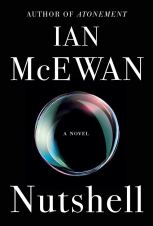
What do you get when one of The Times’ “50 greatest British authors since 1945” takes on one of Shakespeare’s most prolific works? You get Nutshell by the extremely talented Ian McEwan. Part origin story, part modernization, McEwan‘s Nutshell is an imaginative retelling of Shakespeare’s Hamlet that sticks closely to the original while also being intriguing enough to stand on its own for those unfamiliar with the fictional Prince of Denmark. But McEwan goes deeper than a simple retelling, which anyone could do on a surface level of simply updating the vernacular. McEwan strives to answer the most famous question in the world: “to be, or not to be.”
McEwan‘s story opens with Hamlet in the womb, where the concept of being begins, and closes at his birth. At first, I’ll admit, the idea of Hamlet being a fetus kind of threw me, but it was strange and different enough to make me want to see what it was all about. Of course, it helps that I am familiar enough with McEwan‘s other works to know that he is capable of taking something strange and making it beautiful. Nutshell did not disappoint. Fetus Hamlet, as I have affectionately begun to call him, has all the mental and emotional capabilities of a mature adult; developed mostly through the podcasts and talk-radio his mother, Trudy, listens to at night. This lends to to his questioning the idea of, as he puts it, “To Be. Or if not that, its grammatical variant, is.” This questioning is a theme found throughout the book, while the specific use of “be” and/or “is” is most directly addressed in the beginning chapters.
One of the things that makes this specific book a success in my eyes is McEwan‘s ability to write with a sense of poesy that would make the Bard proud. Sometimes it is just a word or two that gets me, like “muted acrimony,” and sometimes it is a full line: “I’m close to my mother’s heart and know its rhythms and sudden turns.” It’s easy enough for anyone who has read Hamlet to update the vernacular, but to update the story with the same attention to language that Shakespeare is known for sets this version far above others.

Leave a comment